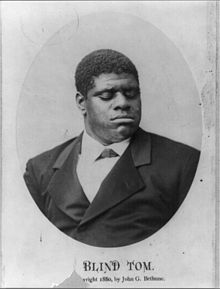In honor of Black History Month, here are few profiles of contributors to history of African descent:
Thomas “Blind Tom” Wiggins
(May 25, 1849 – June 14, 1908) was an African American autistic savant and musical prodigy on the piano. He had numerous original compositions published and had a lengthy and largely successful performing career throughout the United States. During the 19th century, he was one of the most well-known American performing pianists.
Wiggins was born on the Wiley Edward Jones Plantation in Harris County, Georgia. Blind at birth, he was sold in 1850 along with his enslaved parents, Charity and Mingo Wiggins, to a Columbus, Georgia lawyer, General James Neil Bethune.[1] Bethune was “almost the pioneer free trader” in the United States and “the first [newspaper] editor in the south to openly advocate secession” [2]. The new owner re-named the child Thomas Greene Bethune or Thomas Wiggins Bethune (according to different sources).
Because the blind lad could not perform work normally demanded of enslaved Africans, Tom was left to play and explore the Bethune plantation. At an early age, he evinced an interest in the piano after hearing the instrument played by Bethune’s daughters. By age four he reportedly had acquired intuitive, if rudimentary—and imitative—piano skills based solely on hearing. He continually intruded upon the Bethune family residence to gain access to the piano, with Bethune’s daughters abetting these intrusions. By age five Tom reportedly had composed his first tune, The Rain Storm, based on his aural impressions of a torrential downpour. After his extraordinary music skills were recognized by General Bethune, Tom was permitted to live in a room attached to the family house, away from the enslaved quarters. The small room was equipped with a piano.
As a child, Tom began to echo the sounds around him, repeating accurately the crow of a rooster or the singing of a bird. If he was left alone in the cabin, Tom was known to begin beating on pots and pans or dragging chairs across the floor in an attempt to make any kind of noise. By the age of four, Tom was able to repeat conversations up to ten minutes in length but was barely able to adequately communicate his own needs, resorting to grunts and gestures.
Bethune, Thomas’ owner, then hired out “Blind Tom” at the age of eight years to concert promoter Perry Oliver, who toured him extensively in the US, performing as often as four times a day and earning Oliver and Bethune up to $100,000 a year, an enormous sum for the time [3], “equivalent to $1.5 million/year [in 2004], making Blind Tom undoubtedly the nineteenth century’s most highly compensated pianist” [4]. General Bethune’s family eventually made a fortune estimated at $750,000 at the hands of Blind Tom [5]. Oliver marketed Tom as a “Barnum-style freak” advertising the transformation from animal to artist. In the media, Tom was frequently compared to a bear, baboon, or mastiff.
Bethune hired professional musicians to play for Tom, who could faithfully reproduce their performances, often after a single listening. Eventually he learned a reported 7,000 pieces of music, including hymns, popular songs, waltzes, and classical repertoire.
In 1860, Blind Tom performed at the White House before President James Buchanan; he was the first African-American to give a command performance at the White House. Mark Twain attended many of Blind Tom’s performances over several decades and chronicled the proceedings.
Thanks to Tanisha and Bryan Jones and their daughter Sinai for compiling these profiles from the following sources:
1) The Encyclopedia of African-American Heritage, by Susan Altman
2) The Roots website, theroots.com
3) Famous Black Inventors website, black-inventor.com
4) Wikipedia

